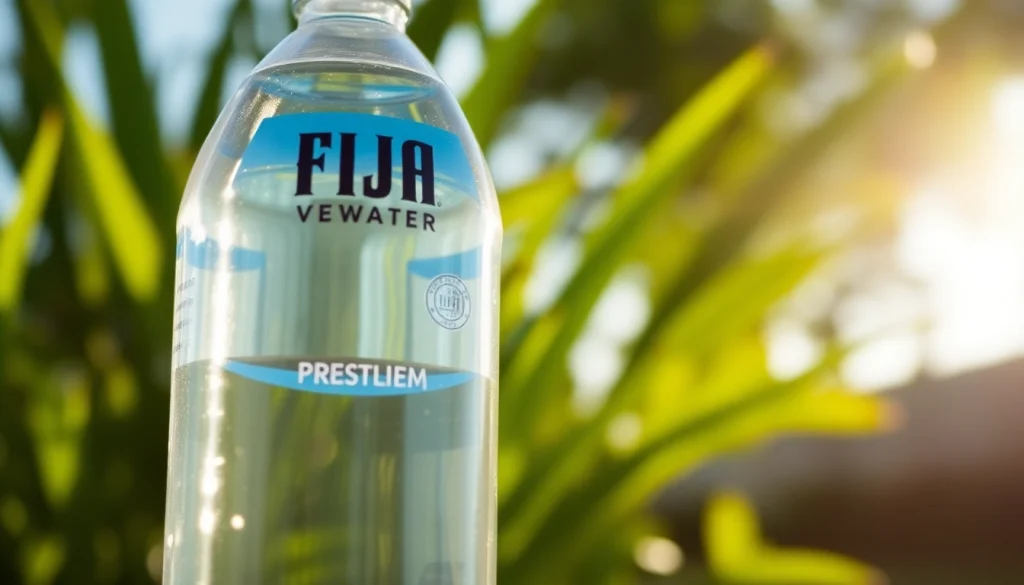Overview of FDA Recalls Fiji Water
In May 2024, the U.S. Food and Drug Administration (FDA) initiated a significant recall involving Fiji Natural Artesian Water, highlighting concerns that have sparked various discussions surrounding bottled water safety. The recall affected approximately 78,533 cases, translating to nearly 1.9 million bottles. This action was classified as a Class III recall by the FDA, which indicates some products present a low risk of adverse health consequences. The focal point of the issue was contamination with certain bacteria and elevated levels of manganese, prompting widespread media attention and consumer concern.
As consumers turn to bottled water for hydration, it is crucial to stay informed about the fda recalls fiji water and potential health implications stemming from such incidents. This article aims to provide a comprehensive understanding of the Fiji Water recall, its implications, and ways consumers can ensure their choice of drinking water is safe.
What Happened During the Recall?
On May 23, 2024, the FDA publicly announced the recall, marking a pivotal moment for Fiji Water and consumers alike. Reports indicated that the recalled batches consisted of bottles that had been found to contain levels of bacteria that exceeded acceptable limits, in addition to manganese. This precipitated concerns regarding possible health hazards associated with consuming the contaminated water.
The nature of the recall prompted the affected bottles to be marketed primarily through Amazon.com, making this incident all the more pertinent to online shoppers who may not be cognizant of such recalls. The response from the manufacturer, Natural Waters of Viti Limited, involved the immediate cessation of distribution and an effort to retrieve the contaminated products from the market.
Background of Fiji Water
Founded in the 1990s, Fiji Water has grown into one of the most recognized premium bottled water brands globally. Sourced from an aquifer on the island of Fiji, it is marketed for its unique taste and purported health benefits. However, despite its popularity, the brand has not been immune to scrutiny over environmental concerns, health issues, and now, safety recalls.
Cases of water contamination associated with bottled water companies are not uncommon, but high-profile recalls trigger heightened scrutiny regarding industry regulations and consumer safety. Fiji Water’s recall brings forth important discussions about the adequacy of safety protocols within the bottled water industry.
Importance of Water Safety Standards
The FDA’s stringent water safety regulations serve as a safeguard to protect public health. These standards regulate contaminants in bottled water, ensuring safe consumption. Bottled water manufacturers must adhere to these guidelines to reassure consumers of their product’s safety. The recent recall emphasizes how fragile public confidence can be and the essential role that regulatory bodies play in monitoring food and beverage safety.
Moreover, the incident underscores the necessity for companies to conduct regular quality testing and transparency in their processes, prioritizing customer trust and health above all. As today’s consumers become more informed and health-conscious, they are more likely to be vigilant regarding the products they choose, making safety standards an even more critical issue.
Details of the Recalls
Volume and Distribution of Affected Bottles
The scope of the recall was substantial, involving over 78,000 cases of bottled Fiji water shipped to retailers and consumers predominantly via online platforms. This volume means that nearly 1.9 million bottles were potentially exposed to contamination prior to the recall announcement. Understanding the distribution channels is vital as consumers frequently purchase bottled water through e-commerce, where they rely heavily on retailer diligence.
The FDA noted that affected bottles were primarily sold through online retailers, with a significant share through Amazon. This raised questions about the responsibilities of retail platforms to ensure the safety of the products they are selling and to inform customers promptly during recalls.
Reasons Behind the FDA Action
The FDA initiated the recall following reports and analyses indicating unacceptable levels of manganese and the presence of bacteria in the affected bottles. Manganese, while necessary in small amounts for human health, can cause adverse effects at elevated levels, potentially resulting in neurological issues, particularly in infants and young children.
Bacterial contamination is a serious concern as it can lead to gastrointestinal disturbances and other health risks. By responding swiftly, the FDA aimed to minimize potential health risks associated with consuming the contaminated water and to uphold public health standards.
How Consumers Can Check Affected Products
Consumers seeking to determine whether they purchased affected products can consult the recall notice released by the FDA and listed on their official website. It is imperative for consumers to routinely check both the FDA recall database and the manufacturer’s announcements to stay informed about potential risks associated with their food and beverage choices.
Additionally, consumers should examine product labeling. The affected bottles typically feature a specific production code that can be traced back to the recalled batches. Awareness of these codes can assist consumers in identifying any potentially dangerous products they may have unwittingly purchased.
Health Implications of Contaminated Water
How Bacteria and Manganese Affect Health
Drinking contaminated water poses significant health implications. Bacteria such as E. coli and Legionella can cause serious gastrointestinal illnesses, respiratory issues, and other severe health effects. Elevated levels of manganese can also lead to more profound health challenges, particularly in vulnerable populations.
While manganese is an essential nutrient, chronic exposure to high levels can result in various neurological problems, including cognitive disruption and movement disorders. Infants and small children are especially susceptible to these adverse effects, underscoring the seriousness of contamination in bottled water.
What Symptoms to Watch For
Consumers who may have ingested contaminated water should be vigilant about potential symptoms of bacterial infections or manganese exposure. Common symptoms may include:
- Diarrhea or upset stomach
- Fever
- Nausea or vomiting
- Fatigue
- Neurological disturbances in extreme cases
If individuals experience any of these symptoms following exposure to potentially contaminated water, they should seek medical attention promptly.
Long-Term Safety of Fiji Water Post-Recall
Looking ahead, many consumers may wonder about the future safety of Fiji Water products. The company has indicated a commitment to rigorous testing and compliance with safety standards, emphasizing transparency in its bottling practices. Long-term safety will depend not only on their adherence to regulatory standards but also on consumer monitoring and feedback regarding product safety.
Such recalls often motivate companies to re-evaluate their quality control processes and enhance their testing protocols, which can lead to improved safety measures. Nonetheless, consumers should continue to research and stay updated on product safety developments, ensuring their chosen water sources meet health standards.
Response from Fiji Water and Remediation Efforts
Actions Taken by the Brand
In response to the recall, Fiji Water took immediate action to rectify the situation. The company initiated a stop-sale order for all affected products and worked closely with the FDA to remove contaminated water from the market. Additionally, they have offered refunds for returned products, acknowledging the burden placed on consumers due to the oversight.
Brand representation reiterated their commitment to quality, pledging enhanced testing protocols and quality assurances to reclaim consumer trust. They are also actively promoting awareness about the recall and proper disposal methods for any affected products.
Reassuring Consumers About Future Product Safety
Rebuilding consumer confidence is a significant focus for Fiji Water. To that end, the brand has committed to transparently sharing their water testing results and any new protocols designed to mitigate risks of future contamination. This proactive communication strategy is essential in reassuring consumers about the safety of their products and the integrity of the Fiji Water brand.
Regular updates through social media channels, press releases, and community outreach programs can play key roles in maintaining transparency and fostering positive relationships between Fiji Water and its consumers.
Public Communication Strategies
Public communication during and after a recall is crucial. Fiji Water’s strategy involves not only product recalls but also consistent messaging about their safety measures and protocols. They are employing a multi-faceted approach to reach affected consumers through notifications via email, social media, and public announcements, ensuring that customers are informed and engaged throughout the process.
Implementing feedback channels for consumers can also be beneficial, allowing the brand to gauge consumer sentiment and further refine their remediation strategies. Comprehensive customer service support to assist in queries related to the recall and product safety will be key in sustaining customer relations.
Future of Fiji Water and Similar Brands
Industry Trends in Bottled Water Safety
The absorption of bottled water into daily life makes safety an increasingly prominent concern. Industry-wide trends suggest a growing emphasis on sustainability and health. As consumers migrate towards more health-conscious choices, bottled water brands, including Fiji Water, may adopt innovative practices such as revising sourcing techniques, investing in advanced filtration systems, and enhancing transparency about their products’ origins and safety levels.
Moreover, enhanced regulations targeting bottled water safety could emerge as a response to several high-profile recalls, leading to a safer environment for consumers across the board. Companies may begin adopting third-party certifications as a measure of accountability, aiding consumers in identifying reputable brands.
Regulatory Changes After High-Profile Recalls
High-profile recalls often serve as a catalyst for regulatory change. The FDA may implement new guidelines for bottled water companies to enhance safety measures and instill more stringent contingency plans when hazards are detected. Greater scrutiny on water sourcing and testing methods is likely as a result of increasing incidents linking bottled water to safety threats.
As industry standards evolve, it will be crucial for companies to stay ahead of the curve, embracing best practices in water safety, environmental stewardship, and health-oriented innovations that meet the demands of a discerning consumer base.
What Consumers Should Consider When Choosing Brands
In the wake of recent events, consumers should adopt a heightened awareness regarding the bottled water they purchase. Understanding the source of their water, the filtration methods utilized, and how companies handle product safety issues should be a primary consideration.
Before making a purchase, consumers are encouraged to:
- Research brands to understand their sourcing and bottling processes.
- Check for third-party certifications that indicate compliance with safety standards.
- Stay updated on any recent recalls or safety concerns associated with their preferred brands.
- Seek transparency in communication from brands regarding their quality assurance protocols.
By actively engaging with brands around safety practices and standards, consumers can play a fundamental role in steering the industry toward a more transparent and health-conscious future.


